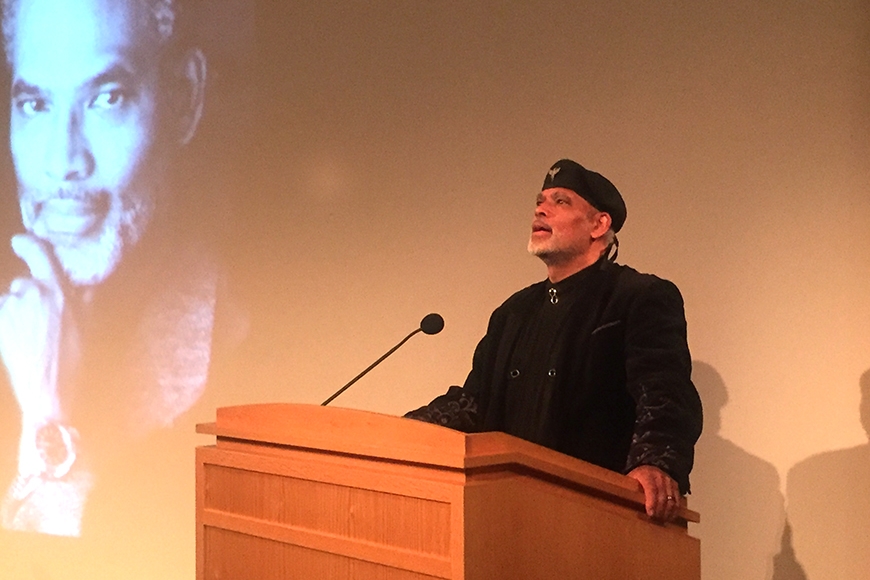John S. Wright: Advocating Change
Distinguished University Teaching Professor of English and African American & African Studies John S. Wright (pictured as his April retirement celebration) spent his last days at the U in a manner reminiscent of his time as an undergraduate in the 1960s. Then, he was instrumental in the 1969 Morrill Hall takeover by the Afro-American Action Committee that led to the establishment of an African American Studies Department and special advising and counseling resources for black students. Fifty years later, at an April Board of Regents special session about changing the names of campus buildings that honor leaders who maintained residence hall segregation, he spoke for over 15 minutes on the historical impact of such segregation policies on black Minnesotans, including his own family.
A photo of Wright addressing the Regents made the front page of The Star Tribune and ended up in The New York Times.
Professor Wright’s aunt, Martha Wright, was a School of Technology math major at the University in the 1930s; as president of the Council of Negro Students she helped lead protests against the administration policies of President Lotus Coffman that barred black students from living in campus dormitories and participating fully in campus life. Wright’s father, another U alum, nevertheless recommended his son attend the U. As Wright told The Minnesota Daily, “He said, ‘Regardless of what the University does that may be unjust or unfair, you have full right to go to that university and expect to be treated fairly and with respect and develop your talents as best you may.’”
Wright received three degrees at the U: PhD in American Studies & History of African Peoples (1977); MA in English and American Literature (1971); and BEE in Electrical Engineering (1968). After the Morrill Hall takeover, Wright directed the U’s new Martin Luther King Jr. program supporting underrepresented communities for three years, while a graduate student.
He then left the University to develop a major in African American & African Studies at Carleton College, where he served as chair and associate professor of African American & African Studies, and as associate professor of English (1973-84).
In 1984, Wright returned to the University as a professor in the department he helped to initiate, with a joint appointment in English. As a scholar, he has focused on African American and African cultural, intellectual, and literary history, oral tradition, and cultural movements such as the Harlem Renaissance and Black Arts Movement. Wright has published expansively on the life and work of Invisible Man author Ralph Ellison, resulting in his book Shadowing Ralph Ellison (University Press of Mississippi, 2006). He was named a CLA Scholar of the College (1987-90), and received national research awards from the NEH and Ford Foundation and from the Bush Leadership Program in Minnesota. In 1981, novelist Ellison nominated him for a MacArthur Foundation Fellowship.
Wright was recognized in 1998 with the highest award for undergraduate teaching at the University, the Horace T. Morse-University of Minnesota Alumni Association Award for Outstanding Contributions to Undergraduate Education. One of his former students was Lou Bellamy, founding artistic director of the Penumbra Theatre in St. Paul, whom Wright would go on to advise over three decades. Bellamy told The Daily that in Wright’s class they studied a piece of folklore similar to a story his grandparents had recounted. “To have that kind of ownership of the printed page and the experience that I thought was unique only to me and my family," Bellamy said, "I can't describe for you how empowering that moment was.”
Among other activities at the U, Wright spearheaded the acquisition in 1985 of the Archie Givens, Jr. Collection of African American Literature and served as its Founding Faculty Scholar for over 30 years. He also helped superintended the NEH-sponsored first nationally touring exhibition on the Harlem Renaissance, mounted in partnership with the Weisman Museum (1988-91). He edited multiple critical series of African American classic texts and created a jazz and poetry ensemble, The Langston Hughes Project—Ask Your Mama: Twelve Moods for Jazz, with which he performed nationally from 1991 to 2001.
Wright served on the Advisory Board for the University Libraries 2017 exhibit “A Campus Divided: Progressives, Anticommunists, Racism and Antisemitism at the University of Minnesota 1930-1942” that led to President Eric Kaler appointing a committee of historians, students, alumni, and faculty—including Wright—to examine the U’s history. The committee’s 2019 report recommended renaming four University buildings: Coffman Memorial Union, Coffey Hall, Middlebrook Hall, and Nicholson Hall. The Board of Regents voted down the proposal at that late April special session.
As he transitions into retirement, Wright has multiple writing and research projects in progress. “I intend to stay very active,” Wright told The Minnesota Spokesman-Recorder. “I’m looking forward to what lies ahead.”



